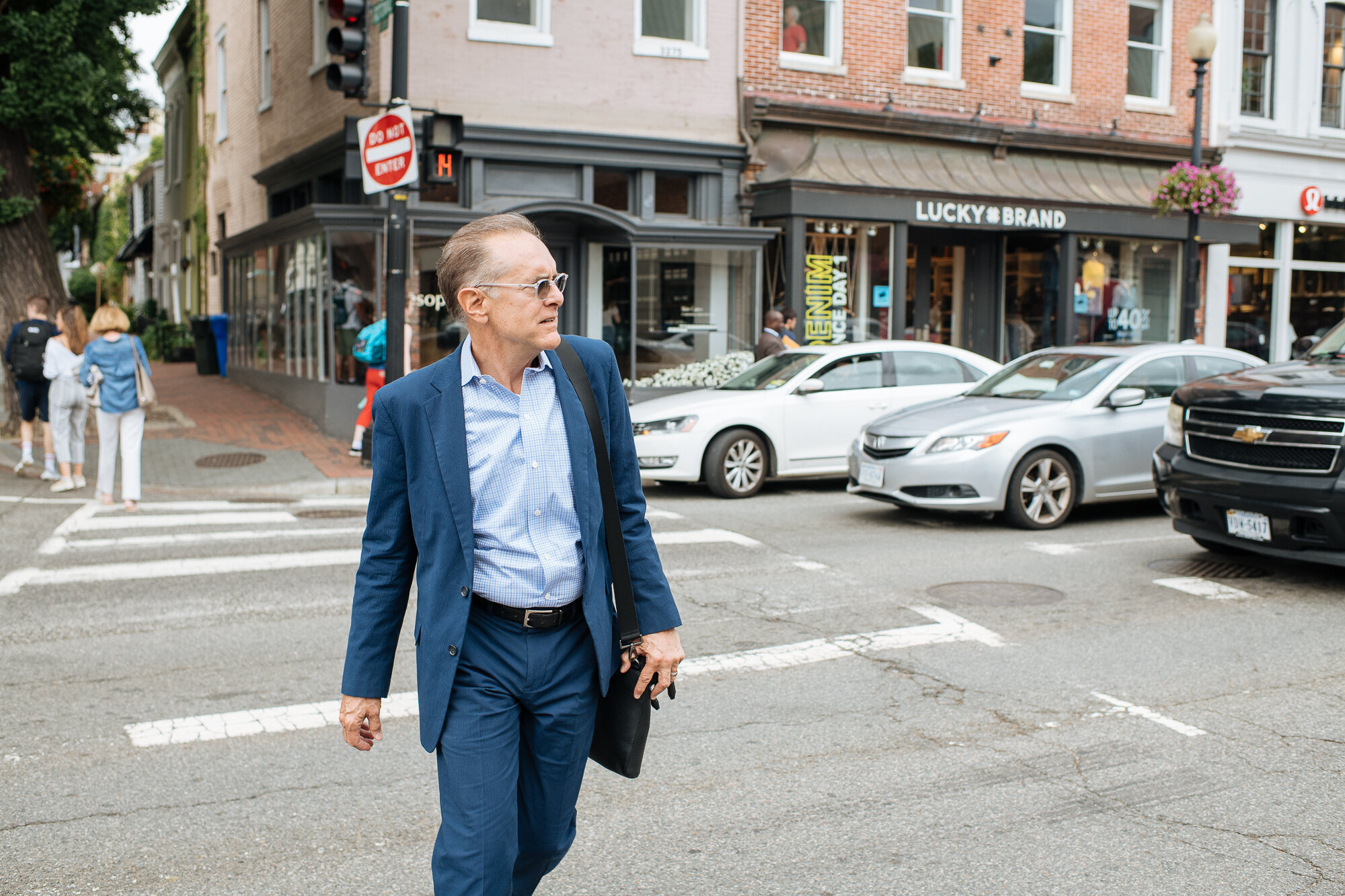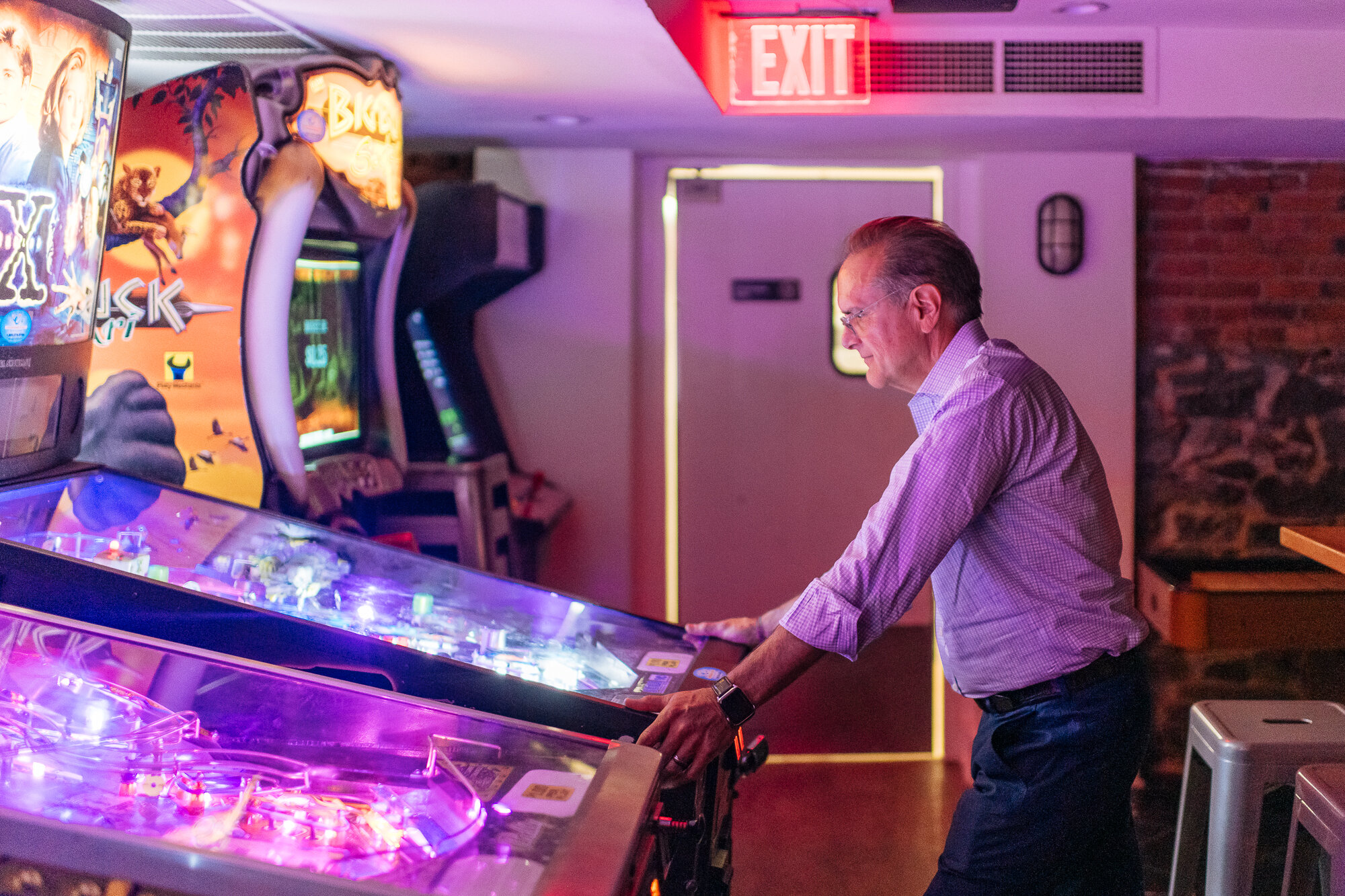‘I Think Georgetown is Facing its Biggest Opportunity Yet’
Bill Miller
Principal, Miller Walker
2715 M Street NW
Bill Miller is a pinball enthusiast. Standing in the glow of the X Files-themed arcade game at Pizzeria Paradiso—a restaurant deal he helped usher in to Georgetown—the commercial real estate broker watches the metallic ball ping off the sides of the machine, reacting and adjusting to each bounce.
Minus a few neon lights, the essence of his work as Principal at Miller Walker isn’t much different.
For more than 25 years, Bill has remained agile—embracing, not fighting, the changing tides of Georgetown’s commercial real estate market.
‘The only thing we know for sure is how people shop today won’t be the same way they shop in five years. Lots of people get unhappy and frustrated with that. The right approach is to embrace the change. Get creative with it.’
Thirty years ago, Bill’s career was similarly in flux. After growing up as an Army brat and graduating from college with a degree in hospitality management, he worked for Marriott, followed by stints at three restaurants. In the midst of his final management gig, Bill earned his real estate license with the intention of going into residential investment. When real estate laws suddenly changed, he was forced to pivot.
‘The group I was managing with at the time had no idea about real estate, so I decide to go into commercial real estate and work with restaurants. It’s a tricky business, but I’ve found it fascinating.’
Among his many career credits since then, Bill was instrumental in ‘rearranging the pieces’ at Washington Harbour to bring in Farmers Fishers Bakers, worked with Jamestown on Church Hall and the expansion of Anthropologie, and—most recently—is welcoming soon-to-open French restaurant Brasserie Liberte into the former Morton’s space.
Georgetown’s ratio of retail to restaurant space has always varied, yet Bill says the commercial district’s fundamentals and natural beauty have remained steady over the years.
‘Georgetown has always been very active. When one retailer would go, others would look to fill the space. People are the most important thing in the physical presence of a retail or restaurant operation, and there are a lot of people in Georgetown for a variety of reasons. Two universities book-ending the neighborhood, plus 2 million square feet of retail, and 3 million square feet of office, create a naturally busy place seven days a week, at all different hours. We don’t have anything like it in Washington, and there are very few cities in the country that have that balance and mix. We’re not a one-trick pony.’
Today, the greatest commercial real estate challenge is striking the right balance between bricks and mortar and online. Not long ago, many believed the former would cease to exist. Bill says that won’t be the case, but retailers and restaurateurs must become more flexible in order to survive.
‘You have to find the proper balance. Reformation is a great example of embodying both the online and the physical. You’re in their store looking at a screen to find what you want to try on. They’ve brought the Internet into their physical store and it’s very clever. We have a number of retailers who started online before coming here. Nobody truly knows what’s to come, so there’s a need to make sure you have some flexibility in how you operate as things change.’
On the retail side, Bill says there are currently two types of stores that generally find success: Well-known brands with a smaller, functional space for customers to simply try on that pair of jeans they’ve been eyeing, and flagship experience stores that offer an adventure, with displays and depth of product customers won’t find elsewhere.
While it’s impossible to predict what’s to come, Bill says businesses would be apt to prepare for a greater integration of technology, both in their operations, and physical infrastructure.
‘It could be as simple as having enough electrical outlets to one day handle all of the screens that may be in your store. Or thinking of ways to make the experience more interesting and “stickier”. Just like malls used to have food courts to keep the shopping experience sticky, we’re now finding food options in some retail operations. Rapha has a coffee bar now. It’s about saying, ‘I know that I don’t know [what’s to come], so let me have some flexibility.’
Landlords must also follow suit. Bill says many building owners are rethinking their assets—converting three-level spaces into ground-floor retail that’s more appealing to retailers looking for smaller spaces and converting upper floors into residential. They’re also contending with more moderate rent increases after decades of exponential growth.
‘We’ve never had a flattening or declining of rents, and that’s going to be one of the biggest frustrations on the landlord side. Rents aren’t just going up. But if you’re a glass half-full person, you could say it’s all become much more interesting.’
Bill is a glass half-full person. He says Georgetown has weathered every storm, and is better than it’s ever been, despite dramatic shifts in the retail and restaurant world it is a time of opportunity.
‘Georgetown isn’t contrived; it happened naturally, and it has a lot of people—a lot of Mayors or stewards of Georgetown, as I call them—who care about it. Every time we’ve seen changes here, we’ve come out the other end better. Georgetown’s never been better. It’s a real urban village that’s attached to the most powerful city in the world, and we have both the fundamentals and the community. It’s going to keep getting better. Just wait and see.’





